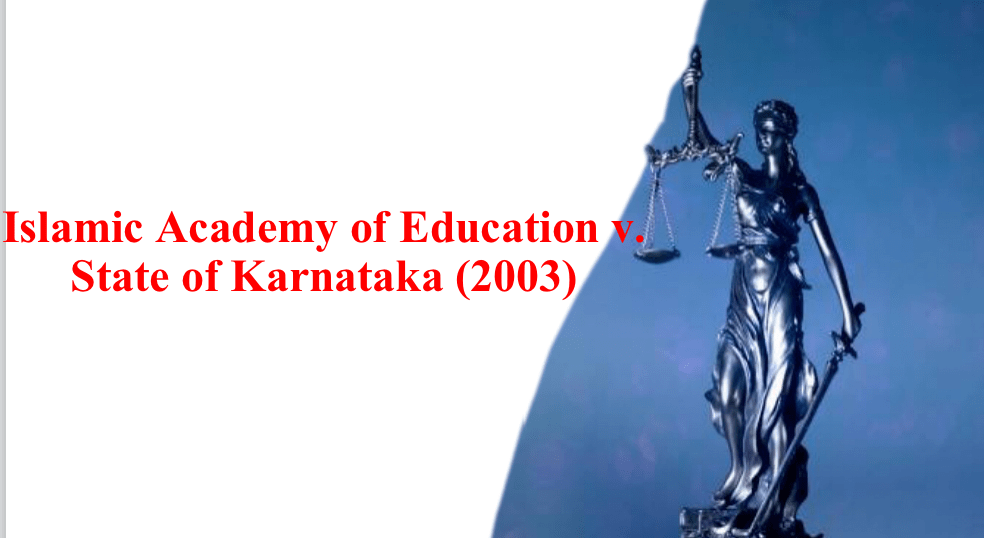
Case
Islamic Academy of Education v. State of Karnataka (2003)
Bench
Chief Justice V. N. Khare, Justice S. B. Sinha, Justice S. H. Kapadia.
Parties
Petitioner -: Islamic Academy of Education (a trust registered under the Indian Trusts Act, 1882)
Respondent -: State of Karnataka
Citation
(2003) 6 SCC 697
Introduction
Islamic Academy of Education v. State of Karnataka (2003) was a case that dealt with the conflict between the principles of autonomy of minority institutions and the need for the government to ensure that education is provided without any discrimination or inequality. The case was brought before the Supreme Court of India by the Islamic Academy of Education, which challenged the government’s decision to deny it recognition as a minority educational institution under Article 30 of the Indian Constitution.
Facts
The Islamic Academy of Education was established in 1991, in Bangalore, Karnataka, by the All India Islamic Foundation to provide education to the Muslim community. The institution applied for recognition as a minority institution under Article 30 of the Indian Constitution, which allows minorities, whether based on religion or language, to establish and administer educational institutions of their choice. However, the state government of Karnataka denied the application citing various reasons, including the lack of a clear indication that the institution was intended to be a minority institution.
Issues
The primary legal issue in this case was whether the Islamic Academy of Education was entitled to protection as a minority educational institution under Article 30 of the Indian Constitution. Article 30 guarantees religious and linguistic minorities the right to establish and administer educational institutions of their choice, without discrimination or interference from the government. This article is meant to ensure that minorities can preserve and protect their distinct cultural and educational traditions, without being forced to conform to the majority culture.
Arguments
- The Islamic Academy of Education argued that it was a minority institution as it had been established by the All India Islamic Foundation, which was a non-profit organization working for the educational and cultural development of the Muslim community in India. The Academy also argued that it fulfilled all the criteria for being considered a minority institution, including having a majority of Muslim students and staff, and providing education based on Islamic values and principles. The Academy further contended that the denial of minority status was unconstitutional and violated their fundamental right to administer an educational institution of their choice.
- The state of Karnataka argued that the Academy had failed to provide sufficient proof that it was intended to be a minority institution. The state further contended that the Academy did not have the necessary credentials to be granted minority status, as it did not cater exclusively to Muslim students and staff, and did not have a significant contribution to the promotion of Muslim culture or education.
Judgment
- The Supreme Court of India held that the Islamic Academy of Education was entitled to protection as a minority educational institution under Article 30 of the Indian Constitution. The court held that the Academy fulfilled all the essential requirements for being considered a minority institution, including having a majority of Muslim students and staff, and providing education based on Islamic principles and values.
- The court further held that the state of Karnataka had failed to demonstrate that the Academy was not a minority institution, and that its denial of recognition was arbitrary and discriminatory. The court emphasized that the state has a duty to ensure that education is provided without discrimination or inequality, and that the autonomy of minority institutions should be respected and protected.
- The court also clarified that the right to establish and administer educational Institutions under Article 30 is not absolute, and that minority institutions must comply with regulatory standards set by the government. The court held that while the government has the power to regulate minority educational institutions, it cannot interfere with their essential autonomy and right to administer their institutions in accordance with their distinct cultural and religious traditions.
Conclusion
The Islamic Academy of Education v. State of Karnataka (2003) case is significant as it reaffirms the principle of minority autonomy in the context of education in India. The case highlights the importance of protecting the rights of minorities to establish and administer educational institutions of their choice, without interference from the state. The case also highlights the need for a balance between the autonomy of minority institutions and the regulatory role of the government in ensuring that education is provided without discrimination or inequality.
https://indiankanoon.org/doc/1978528/
https://www.google.com/amp/s/www.casemine.com/judgement/in/56b48d3f607dba348fff2217/amp




0 Comments